| Construction Rating: | starstarstarstarstar_border |
| Flight Rating: | starstarstarstarstar |
| Overall Rating: | starstarstarstarstar |
| Manufacturer: | Rokitflite |
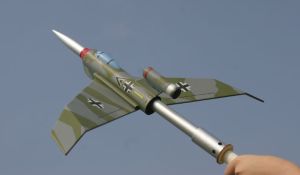
Brief:
This is a boost glider featuring a rear ejected pop-pod. Propulsion is handled by 18mm motors. Pod returns safely on
a parachute, while the German themed plane glides on towards its secret mission. Manufacturer rates this at a skill
level 3.
Construction:
This kit has a bunch of parts. Quality is top notch.
The list of parts is as follows:
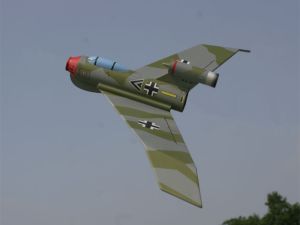
- 1 Instruction CD
- 1 12 1/2” BT-20 tube
- 1 3 7/8” BT-20 tube
- 1 2” BT-50 tube
- 1 1”BT-21 tube
- 1 6” BT-55 tube
- 1 2 1/2” BT-20 tube
- 2 4” T-2+ tubes
- 1 Pre-weighted BT-20 nose cone
- 1 Pod Small Parts Bag containing:
- 1 Thick 20-50 cardboard centering ring
- 1 Thin 20-50 cardboard centering ring
- 2 20-55 laser-cut plywood centering rings
- 1 5-20 motor block
- 1 Motor clip
- 1 Motor clip hold-down ring
- 1 12” piece of Kevlar® cord
- 1 1” BT-20 tube coupler
- 1 12” parachute kit
- 1 Laser-Cut Glider Parts Bag containing:
- 2-Balsa main wing sections
- 2-Balsa wing tip sections
- 1-Balsa rudder
- 1-Thick balsa 21-55 centering ring
- 1-Basswood landing skid
- 1 Resin cast jet engine insert
- 1 Package red nose weight clay
- 1 Package gray balance clay
- 1 Resin cast canopy
- 2 Craft sticks
- 1 Canopy masking sheet
- 1 Large sheet vinyl masking material
- 1 Laser-cut wing dihedral jig
- 2 1”x 1/4”x 1/4” balsa blocks
- 1 Waterslide decal sheet
- 2 Clear self-adhesive trim tabs
- 1 Tube marking guide sheet, glider nose shroud sheet, glider parts
- Guide sheet and root/tip sanding guide
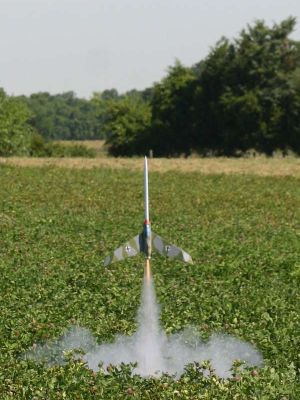
Scott Branche, the designer of this kit, thought of everything. The instructions are well documented and well illustrated thanks to a slough of color photos included on the CD. The steps follow a logical order and have the builder do a series of sub-assemblies. Each sub-assembly is ordered in such a way where the builder is constantly moving forward with the build, there is no "slack time". Despite the large number of parts, they get used up quickly and efficiently.
The templates are accurate, and the laser cut wing jig helps with sanding joint bevels and with wing dihedral. The jig is little fiddly to work with but does assist in these areas. I'd much rather see it included in the kit than to be without, as it helped tremendously.
The laser cut balsa is high quality, and the resin cast parts are excellent. Very nice, laser cut, lite plywood center rings were used for the pop-pod. I was pleasantly surprised by the inclusion of those, as they should hold up very well.
The tubes are good quality and are all standard sized, save one. There is an odd sized tube (BT-21) that makes up the nose of the glider. It allows a baffled pop-pod to slide through the glider rather than the glider being "hitched" to the pod, like most booster gliders.
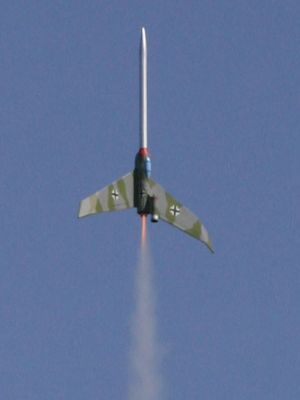 Most of the standard rocket building tools and glues are required to build this.
However, one tool used that is not typical of a low power rocket build is a hole punch. You will need one for this to
build the pop pod. The punch is a very inexpensive item that can be found for a dollar at local dollar store or craft
store. When I spoke to Scott personally, he said he was even considering including one of them with the kit! I'll tell
you, it's the only the he did leave out besides a knife, glue, and skill. This is about as complete of a kit as you'll
find, and all for a reasonable price.
Most of the standard rocket building tools and glues are required to build this.
However, one tool used that is not typical of a low power rocket build is a hole punch. You will need one for this to
build the pop pod. The punch is a very inexpensive item that can be found for a dollar at local dollar store or craft
store. When I spoke to Scott personally, he said he was even considering including one of them with the kit! I'll tell
you, it's the only the he did leave out besides a knife, glue, and skill. This is about as complete of a kit as you'll
find, and all for a reasonable price.
Finishing:
Finishing is the hardest part of the entire process. There is plenty of wing surface to fill and sand, and the
painting can be tricky. I followed the instructions carefully during this procedure. I did make a couple deviations,
one of which that may have fouled my paint job.
I used Elmer's Fill 'n' Finish wood filler, rather than use multiple coats of primer to fill the balsa. No problems there, as my finished glider finished out at the nearly identical weight to some of the prototypes. I know of at least one other person who skipped filling and chose to laminate with sticker paper with similar results. The choice is up to you.
The other deviation I made, was to to use Rustoleum paint instead of Krylon, which is recommended per the instructions. This proved to be a mistake. I didn't wait long enough for the paint to dry before applying the orange masking material that is included with the kit. The masking material is included if you want to follow the camouflage pattern that is detailed on the instruction CD.
When I shot my second color everything looked fine, but when I removed the masking material, it took the bottom layer of paint with it. The result was something akin to skin peeling after a bad sunburn. Not pretty. I had waited at least 24 hours before adding the second color, but that wasn't nearly enough time for the paint to cure.
I sanded the whole thing down to the filler layer, re-primed and painted. This time allowing several days between coats. I also used blue painter's masking tape the second time around since I had already used up the orange material. The orange mask has a pretty aggressive tack, but I can't blame the peeling problems entirely on that. I think it was a combination of that, and the paint not being fully cured. Make sure your paint is fully dry before masking or adding multiple coats. If your using Krylon it shouldn't be as much of a concern since that product dries very quickly.
The second time I had much better results. I was very pleased with the way it turned out. The decals really bring this plane to life. They are by far and away some of the best decals I have ever worked with. Be careful when sealing the decals with clear spray (dullcoat). Very light coats are required so as not to wrinkle the decals. A test strip of decals is included to check compatibility with the brand of clear coat you are going to use. Use it! I didn't practice on the test strip first and ended up wrinkling the decals in a few spots where I sprayed a little too heavy.
Despite a few setbacks, this came out better than my wildest imagination. I was quite pleased!
Don't be bashful about filling and painting this bird. It's practically a requirement in order to balance it and fly properly. The manufacturer highly recommends doing so, however, just don't go overboard with it.
Construction Rating: 4 out of 5
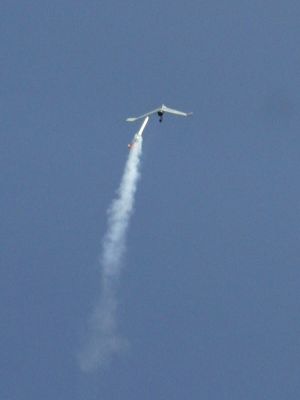
Flight:
The manufacturer recommends a B6-2 for the first flight. This is a very good choice for most fields. I used this on
my first flight and it boosted and separated as expected. The pod recovered fine, but it didn't glide as expected.
After separation, the glider just did a hard spiral downward and crashed into the hay field. Luckily, the only damage
was to the nose tube, which was pressed back into shape, reinforced with CA, and sanded smooth again.
The boost is surprisingly very stable and straight with a barrel roll or two on the way up. Nice and slow.
Recovery:
Included with the kit are two self-adhesive plastic trim tabs. Only use these as a last resort, but you probably
won't need them! I mistakingly thought I would need to use one, seeing that the glider didn't balance laterally, one
wing felt heavier. After several inconsistent (and nose battering) hand tosses later, I came to the conclusion I should
add a tab to one side. Turns out, it wasn't needed. As much as it pains me to say this about a boost glider, don't hand
toss the Fake Wulf, you're wasting your time!
After the faux pas of the maiden flight was behind me, I threw caution to the wind and removed the trim tab. The following flights were spectacular. The glider has a nice lazy glide, albeit a fairly short duration compared to competition standards. It's fun to watch. I have nothing in my fleet that can even compare to this. It's very unique in its design.
Out of six flights total, there was only one where the pod didn't completely separate from the glider. I blame this on a weak ejection charge. The pod ejected just far enough to allow the chute to deploy and the pod and glider came down together under chute unharmed.
Use caution when deciding to use a C motor! My second flight on a C motor was it's last. A very large field is required depending on how your bird behaves. I tried to take out some of the turn on mine, and that proved to be big mistake. It made a beeline for the nearest treetops it could find and sailed right them, never to be seen again.
Flight Rating: 5 out of 5
Summary:
PROs: I am a boost glider fanatic. When I first heard about this kit on The Rocketry Forum, I was very anxious to get
my hands on one. I was not disappointed. This kit is probably one of the best thought out, best valued, best quality,
best packaged kits I have ever seen. The manufacturer is a kit collector himself and it really shows. Many people,
including myself, have shown reluctance to open and build one of these as the sealed package looks that good. Do
yourself a favor and buy one, or two, or three, and build one. You'll be glad you did!
CONs: I really can't find any fault with this kit. The only thing that I'm on the fence about, is the mask material that is included. It seems a bit tacky for it's intended use, but if you use Krylon and/or make sure your paint is fully dried, then it will most likely go as designed.
Overall Rating: 5 out of 5
 |
 |
Flights
Sponsored Ads
 |
 |











